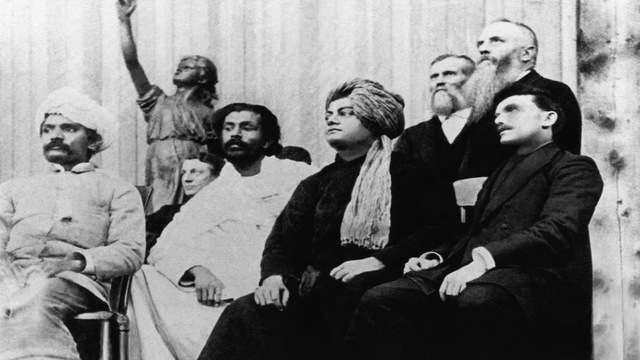Arise, awake, and do not stop until the goal is reached...
The late 19th century witnessed a mighty spiritual resurgence in India. Swami Vivekananda, the illustrious disciple of Shri Ramakrishna Paramhansa, played the main role in spreading the message of his master throughout India and overseas.
To the teeming lots of India, Swami Vivekananda is understood primarily as a great social reformer. He sought to eradicate the social evils born of bigotry and narrow-mindedness and to inculcate fellow-feeling amongst man.
This mission was in consonance along with his ideal of universal brotherhood and humanity. But Swami Vivekananda had a philosophic message too alongside along with his social mission, and these had been an inseparable part of his whole outlook of man's life and future.
Swami Vivekananda's 118th Maha Samadhi Anniversary
His philosophy was essentially a philosophy of religion, its theme being man's quest for the divine. He says that man is a compound of animality, humanity, and divinity.
It is his mission to raise the brute-man to the extent of man and man to the level of God. So, religion is an evolutionary course through which man might rise from the bottom to the highest stage of existence.
And on this unfolding course of man should make aware efforts, efforts at making the latent divinity in his patent. A man ought to ever try for a higher manifestation of the divine that's inherent in him. It is that this Godward progress of Man that Swami Vivekananda calls religion.
When Swami Vivekananda attended the Parliament of Religions in Chicago in 1893, it was not as an official delegate of any explicit nonsecular group.
He stood for one thing bigger. He got here as an exponent of the traditional Indian Upanisadic philosophy of Universal brotherhood and of the universality of religious truths.
The Upanisadic philosophy of Religion transcends all dogmas and rituals which range from faith to faith.
It is the dogmas and rituals, which represent the outer coat of faith, that breed intolerance, hatred, and battle. Once these divisive forces are surpassed, will probably be discovered that every one religion does, of their essence, uphold identical religious values.
The conflicts of faith will then be resolved right into a concord. This Universal Religion is just not conditioned by time, place, and circumstances.
And, the totally different religions are however totally different aspects of this Universal Religion. The range of paths characterizes not solely religions but additionally totally different sects inside a similar faith.
The totally different paths finally all boil right down to 4 predominant paths for the conclusion of divinity - the trail of Work, of Devotion, of Psychic management and of Knowledge.
Any considered one of these paths or any combos of those paths can lead man on to the divine objective.
Teachings Of Swami Vivekananda
The path of Work, or Karma Yoga, is the trail notably suited to a person of lively temperament, that's, a person with the 'Rajo-Guna' dominant in him.
This path requires that the work ought to be selfless work, work is done in a spirit of responsibility with none expectation of reward, leaving the outcome to God's will. It should be 'Nishkama Karma'.
But this path additionally enjoins that the work executed should be within the spirit of service to man. In the fixed effort to do good to others in a selfless method, we're additionally serving to ourselves to be good.
It ought to be a self-effacing disinterested service of man, and repair rendered on this spirit will rely on as service to God. Karma Yoga destroys the ego, helps promote a sense of brotherhood, and step by step purifies a person for the blossoming of divinity inside him.
The path of Devotion
The path of Devotion, or Bhakti Yoga, calls for love for God with the same strong attachment that one often has for worldly issues.
This path operates on the airplane of feelings, emotions, and passionate ecstasies. Here is concerned the center, not the mind or the rational defective.
God is right here handled as grasp, youngster, sweetheart, and so forth. Thus, Hanumanji's relationship to Rama is that of servant and grasp. Yashoda's relationship with Krishna is that of mom and youngster. Radha's relationship with Krishna is that of a married girl and her paramour.
In Radha's love, there's a whole give up of her being to Krishna, heedless of all penalties. Radha had the 'Madhurabhava', an unrestrained lawless love for the Lord in whole forgetfulness of disgrace or honor.
This state is acknowledged as the very best state of affection in Bhakti yoga. Incidentally, in Christianity, we discover adoration of Christ as a baby and whilst a beloved. Further, the God the Christians search is a Personal God, as in Bhakti yoga.
The third path, the path of Mind-control or Raja yoga, believes in realizing the divine via a graded sadhana (observe), which incorporates Asana, Pranayama, and Dhyana.
It progresses type the physical to the psychological, and from the psychological to the spiritual. The final stage, Samadhi, is the stage of superconsciousness, a transcendent state the place there's a direct perception of spiritual truths.
The fourth path is the path of Knowledge or Jnana Yoga. Its method is intellectual, continuing alongside the traces of reasoning, self-questioning, and rational evaluation. In this sadhana, we should always first discover out what we're not.
This 'neti, neti' or unfavorable method will probably be adopted by the constructive method of asserting what we actually are - we should always assert that we're Brahman, whose essence is Being, Consciousness, and Bliss or Satchidananda.
This we should always meditate upon until we obtain oneness with Brahman which is everlasting, unchanging, and all-pervading. This path has been adopted by plenty of Upanisadic seers.
Swami Vivekananda's Concept of Yoga
The 4 paths have been introduced collectively and harmonized within the emblem of the Ramakrishna Order. Swami Vivekananda is worried about the necessities, not the accidentals, in faith, and it's no surprise that in its universality and loftiness- it has an enduring attraction for us.

















No comments:
Post a Comment
Thanks for reading my blog